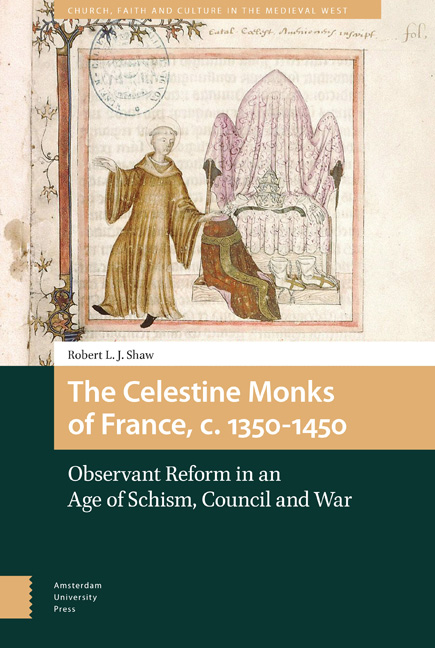Book contents
- Frontmatter
- Contents
- Maps and Figures
- Abbreviations
- Acknowledgements
- Introduction: The Celestine monks of France and the rise of ‘Observant’ reform
- Part I The French Celestines in their world
- Part II The world of the French Celestines
- Epilogue and conclusion
- Appendix 1 Lists and map
- Appendix 2 Reductions of foundation Masses (beyond anniversary Masses) at the Celestine monastery of Paris, 1414 and 1436
- Appendix 3 Reduction of foundation Masses (beyond anniversary masses) at the Celestine monastery of Sens, 1414
- Index
5 - The cultural outreach of the French Celestines
Published online by Cambridge University Press: 16 February 2021
- Frontmatter
- Contents
- Maps and Figures
- Abbreviations
- Acknowledgements
- Introduction: The Celestine monks of France and the rise of ‘Observant’ reform
- Part I The French Celestines in their world
- Part II The world of the French Celestines
- Epilogue and conclusion
- Appendix 1 Lists and map
- Appendix 2 Reductions of foundation Masses (beyond anniversary Masses) at the Celestine monastery of Paris, 1414 and 1436
- Appendix 3 Reduction of foundation Masses (beyond anniversary masses) at the Celestine monastery of Sens, 1414
- Index
Summary
The French Celestines as a political symbol
On 14 November 1432, Anne of Burgundy, duchess of Bedford, died suddenly during an outbreak of pestilence, of the sort that were recurrent throughout the late medieval West from 1348 onwards. The sister of Philip the Good, duke of Burgundy, in 1423 she had married Henry V's brother, John, duke of Bedford, who acted as regent in France for the minor Henry VI; she was thus a cornerstone of an Anglo-Burgundian alliance in the years after the death of Henry V (31 August 1422). Already weakened by Lancastrian military setbacks against the forces of Charles VII, that alliance received a further blow with her death: the reconciliation between Philip and Charles VII would be confirmed on 20/21 September 1435. But her political importance went beyond interactions between princes. Writing contemporaneously, the ‘Bougeois of Paris’ described the effect of her death on the citizens of the town, as well as her funeral, held at the Celestine house of Notre-Dame de l’Annonciation:
The epidemic continued unchecked in Paris; it attacked the duchess of Bedford, wife of the regent of France, sister of the duke of Burgundy, by name Anne, the most delightful of all the great ladies then in France, for she was good and beautiful, and of a beautiful age too, being only 28 when she died. The Parisians loved her. She died in the Hôtel de Bourbon near the Louvre on 13 November, two hours after midnight between the Thursday and the Friday, and with her died most of the hope that Paris had, but this had to be endured. She was buried next Saturday at the Celestines, and her heart at the Augustinians. All the Saint-Germain people were present at her burial, also the priests of the confraternity of citizens, each in a black stole, carrying a burning candle. They sang as they went; as the body was being lowered into the grave the English chanted most movingly by themselves in the fashion of their own country.
The Bougeois's words – and indeed the entirety of his journal – give a flavour of the ‘public opinion’ that existed in Paris at this time: Anne of Burgundy was considered ‘the most delightful of all the great ladies then in France’ – ‘The Parisians loved her’.
- Type
- Chapter
- Information
- The Celestine Monks of France, c. 1350–1450Observant Reform in an Age of Schism, Council and War, pp. 211 - 260Publisher: Amsterdam University PressPrint publication year: 2018



